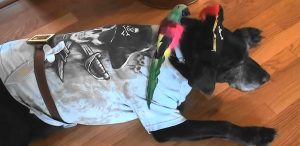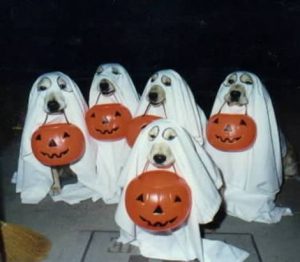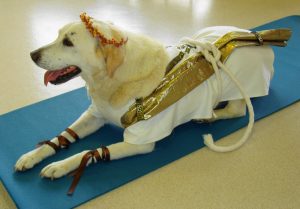Halloween has always been my favorite holiday. A bag full of treats and scary costumes make me happy, but these things can be a real terror for some pets. Hazards come in two flavors: environmental and edibles.
I once trained a Dachshund puppy named Sparky* and he was a happy little guy, until he entered adolescence and a developmental fear stage. Then he became alarmed at every person passing by his home. He often stood guard at the window waiting for scary things to bark at.
For Sparky, environmental things threatened him.
His owners called me to help Sparky a few weeks before Halloween. We agreed since Sparky was already frightened by passersby the prospect of dozens of strangers wearing costumes parading up to the front door and entering the home would likely terrify him.
Some intensive training and behavior modification enabled Sparky to develop confidence and he coped very well with the 70 or so Trick-or-Treat visitors the family hosted Halloween evening. Had the owners not planned ahead then poor Sparky would have been spooked.
Greeting Halloween visitors repeatedly through the afternoon or evening could easily allow frightened dogs or cats to rush out the door and become lost. Any holiday or special event in which people are coming and going can expose pets to risk, and July 4th is the single busiest day of the year at pet shelters due to frightened animals getting lost.
Preparing a pet safe haven, as Sparky’s owners did, gives pets a secure and comfortable place to go, preferably with a companion and toys to play with.
A safe haven is a space set aside for a pet to be away from guests and visitors, secured by a door. Locking the door prevents accidental release. If a family member can remain with the pet during the activity then engaging in play or training games provides companionship and distraction.
A professional pet sitter may also be engaged to fill that role. If nobody is available to help consider placing your pet in the safe zone with food-filled toys to play with, such as a Kong, Wobble Kong or Magic Mushroom. Food-filled toys give a dog a joyful activity to engage in over a length of time.
Calming music such as iCalmDog or Through A Dog’s Ear reduce stress. Lavender essential oil has calming effect, as does an Adaptil diffuser for dogs, and Feliway for cats. Zylkene is a safe canine calming product derived from cow’s milk and comes in powder or capsules.
To prevent the alarming repetition of knocking and doorbell ringing, you may station yourself outside the front door wearing a costume, offering treats before children startle your pet. Enjoy yourself greeting Halloween spooksters and spare your pet the distress.
Your veterinarian may also prescribe fast acting anti-anxiety medication for the event. Many of these options have been suggested to me by several board-certified veterinary behaviorists to reduce anxiety and fear.
While the noises and interruptions of Trick-or-Treaters are obvious problems, less well known are the dangers posed by treats
Some fruits and candies can sicken pets and should be kept away from curious animals through strict management. Keeping a dish full of treats by the door may be convenient for humans to hand out, but may also be snatched by hungry dogs when nobody is looking.
Most people know chocolate is harmful to dogs, but it is also bad for cats. Solid chocolate is worse than a thin coating, and dark chocolate is more dangerous than milk chocolate. The danger of chocolates depends upon the type and quantity consumed, and the body weight of the dog.
Theobromine and caffeine in chocolate are to blame for toxicity, according to Scott Fausel, medical director of VCA Sinking Spring in Sinking Spring, Pennsylvania.
Grapes and raisins are even worse, and eating a single one could kill a dog. Justine Lee, D.V.M, DACVECC, DABT board-certified veterinary specialist in emergency care and toxicology warns “When ingested by dogs, grapes and raisins can cause acute and irreversible kidney injury.”
Many years ago I fed my Labrador, Samantha, grapes as a treat. She survived my stupidity, but that was just dumb luck. Now I know better.
Those who prefer sugar-free treats should know that xylitol is an artificial sweetener found in hundreds of products including gum and candies. Eating even a little may cause severe liver damage or death. Fortunately a list of products containing xylitol is available.
The safest strategy is using careful management keeping treats and pets away from one another, and carefully inspecting each treat your child brings home. Children may enjoy offering their treats to pets so careful supervision is critical.
If you suspect your dog has eaten something harmful you may call the ASPCA Animal Poison Control Center (888-426-4435) or Pet Poison Helpline (855-764-7661) 24 hours a day, year-round. Also identify in advance the emergency veterinary clinic nearest your home and post that information on your refrigerator beside the poison hotline numbers.
You may also consult your veterinarian prior to the holiday and seek emergency advice for “What if” scenarios. It is hard to think clearly and remember things during a crisis so written notes will help you do what is most beneficial and in a timely manner.
Planning ahead can keep your kids and pets safe to enjoy the creepiest holiday of the year. Happy Halloween!
* A fictitious name
(Please be careful about dressing dogs up in costumes. My dogs, Jake and Charlie, were very comfortable with all forms of handling and enjoyed the Halloween costume contests pictured here. At 15 years Jake had a grey beard and wore his pirate outfit with grace, while Charlie enjoyed all the attention of playing Emperor for a day.
Other dogs would be uncomfortable or frightened as they are restrained to put on a costume, which could even provoke a bite. Know your dogs, be aware of stress signs, and respect what your pet is telling you.)



